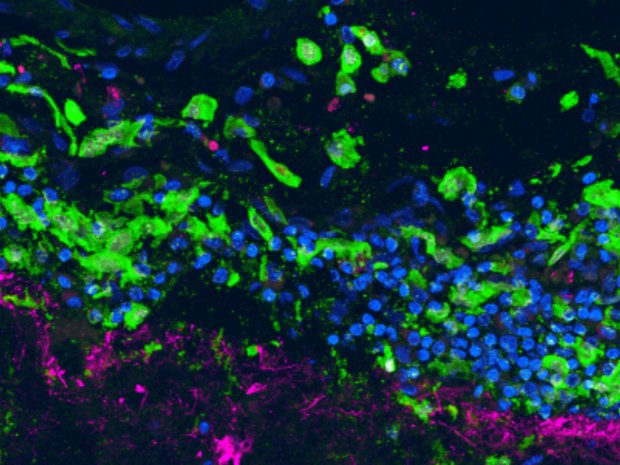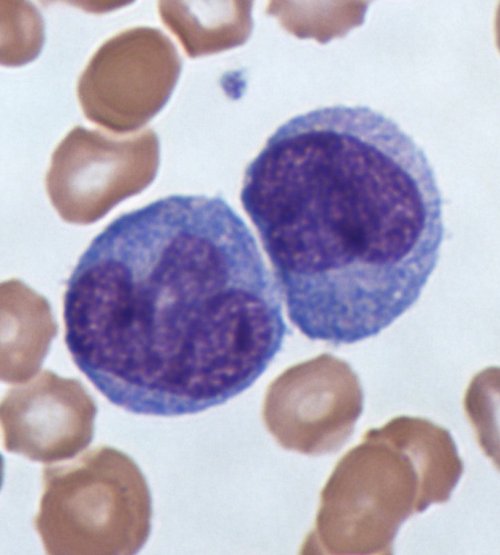
Behind the headlines: could modifying immune cells treat MS?
Recently, a therapy which reprograms your immune cells was used to treat a small group of people with the condition lupus. MS is similar to lupus because they both involve the immune system attacking the body. So could the findings help people with MS?
What is CAR-T therapy?
Chimeric antigen receptor T cell therapy (CAR-T) is currently used to treat some cancers.
It collects one type of immune cell from your blood, called T cells. These cells normally find and kill infections. Doctors reprogram these immune cells in the lab to find and kill specific cells instead, like cancer cells. Next, they reintroduce them into the same person. The cells now attack whatever the researchers have modified them to recognise.
What did the latest research show?
Researchers wanted to know whether CAR-T might be able to treat the most common form of lupus. They collected cells from the blood and modified them to attack the cells which cause damage in lupus. This study involved five people for only four months overall. There was no group getting a different treatment to compare to. So this research is in the very early stages.
This approach was different to using CAR-T to treat cancer because the cells causing damage in lupus are also part of the immune system. They are called B cells.
Read more about the immune system and MS
When the five participants in the recent trial received their modified cells, their B cells were successfully wiped out. So the B cells would no longer be able to cause damage. After three months, all five people saw improvements in their symptoms, including less fatigue.
Because B cells are an important part of the immune system, you wouldn’t want to be without them forever. And we know the body can make new ones. After four months, the body had regenerated new B cells - importantly, without the type which attack the body. It looks like their immune system had a reset.
Read the paper on CAR-T therapy for lupus
Could it help people with MS?
We don’t know if these results can be translated to MS. We won’t know without further research. To find out whether CAR-T could help people with MS in the future, we’d need to have controlled trials. We’d need to be sure it was safe and effective.
We can’t be certain it would reset the immune system for people in MS as it did for these five people with lupus. This is because the immune attack in MS and lupus is different.

In both MS and lupus, B cells attack the body where they shouldn’t. So some people have suggested removing B cells with CAR-T therapy could be a treatment for MS. Several existing treatments for relapsing remitting MS already work by reducing the amount of B cells. If CAR-T works in the same way, it could have the same effect as these treatments. But we don’t know if CAR-T would be more effective.
We can’t be certain it would reset the immune system for people in MS as it did for these five people with lupus. This is because the immune attack in MS and lupus is different. In lupus, it’s one group of B cells damaging tissues and organs all over the body. In MS, it’s several different types of immune cells which mistakenly attack myelin in the brain and spinal cord.
Dr. Riccardo Saccardi, an expert in HSCT, highlighted these results at the scientific conference ECTRIMS this year. He said he "didn't know whether these data can be transferred in the future to MS. But it's an extremely stimulating topic in the near future."
Would this treatment be safe for people with MS?
We don’t know if CAR-T would be safe for people with MS. It’s risky to wipe out a person’s immune system. It leaves them prone to infection while it regenerates.
It could also affect the way the immune system responds to infections in the future. From the five people with lupus who had CAR-T therapy, their immune response to a small number of vaccines didn’t change. We’d need to follow up with these people later to be sure.
What’s next for this research?
In the lab, researchers gave CAR-T therapy to mice with an MS-like condition. They aimed to kill off a type of immune cells – but not B cells. This reduced the symptoms for the mice. So B cells aren’t the only cell involved in MS.
A type of CAR-T therapy for people with MS is currently in trials. But the cells have been modified to seek only EBV-infected B cells. And they’re using modified cells from donors rather than from the person who receives them.
Read about the current trial for CAR-T therapy
There’s more to understand before we can translate the trial for lupus directly for people with MS.



